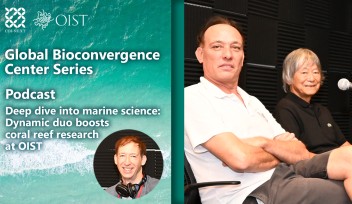What makes a healthy mind?

The first podcaster-in-residence at the Okinawa Institute of Science and Technology (OIST), DJ Nick Luscombe, delves into the research being done at the Global Bioconvergence Center of Innovation. The center is committed to promoting three interconnected themes: mental health, physical health, and environmental health, to realize the concept of “One Health” on a global scale, summed up in the motto “One World, One Health”.
Supported by a grant from the Japan Science and Technology Agency’s Program on Open Innovation Platform for Academia-Industry Co-Creation, researchers at the center focus on the interrelationships of these three themes and how to sustainably protect each of them in the next two decades.
The center uses the multidisciplinary approach of “bioconvergence”, which integrates diverse fields such as life sciences, marine sciences, engineering, artificial intelligence, and complex systems. By collaborating with diverse groups which include educational institutions, government entities, and businesses, the center aims to develop practical solutions for a sustainable society.
In this episode, DJ Nick talks to Prof. Tom Froese, the head of the Embodied Cognitive Science Unit at OIST, about the work being done by the center under the theme “mental health” and the concept of mental well-being today.
Prof. Froese discusses the difficulty of studying interactions that are not easily seen and how modern technologies can help us understand how the interactions between the brain, body, and environment affect human health.
“It seems like health and well-being have to do with a certain flexibility. There’s a certain resilience which means that even if adverse events happen, you can adapt in creative ways. There is a kind of possibility for open-ended change and adaptation to whatever life throws at you,” he explained.
He also highlights the need to recognize the value and impact of downtime and sleep on mental health. “We also need the absence of function in order to have function performing at its optimal.”

Understanding the reasons behind our natural behaviors, such as why we feel good after a walk or being in nature, is important. By being aware of these natural instincts and understanding why they happen, we can improve and adjust our habits for maximum benefits.
Fast-paced changes like social media, the metaverse, and advanced AI also seriously affect our mental health. It is not just about having too much information; these changes also shape us internally because our minds are closely linked to the world around us.
“We don't have any kind of evolutionary or natural intuitive responses to that situation because it's unprecedented in our history. We're actually kind of behind, we don't really understand the consequences of the world in which we live in on our minds.”
By partnering with a wide range of experts, the Global Bioconvergence Center of Innovation is actively improving our knowledge on mental health.
For press enquiries:
Press Inquiry Form














